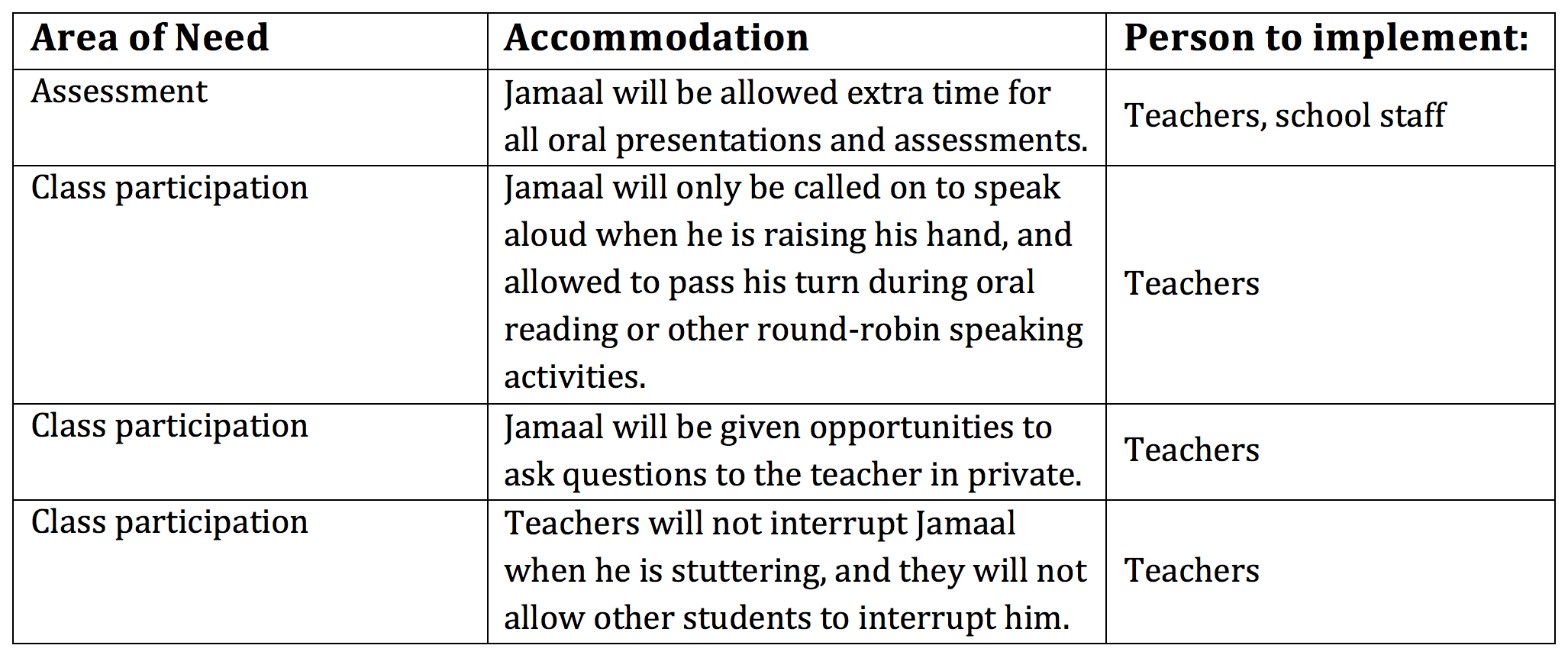

Not every child who stutters needs to be pulled out of classes for weekly speech therapy, as is often dictated by student IEPs. But if you don’t have an IEP, how can you still ensure that your child is not discriminated against and given appropriate classroom accommodations?
The Rehabilitation Act of 1974 included a law (called Section 504) to protect people from discrimination based on disability, including students in public schools. The 504 Plan is a formal document that explains how the school and its staff will accommodate the student’s needs to be sure that the child does not have any unfair disadvantages because of their stutter.
504 Plans can be powerful (and empowering) tools for children who stutter if an IEP is not a good fit. Here are two accommodations that we often recommend for students who stutter to include in their 504 Plans:
• The student will be allowed extra time for any oral presentation or project.
• The student’s teachers will be educated on how to support children who stutter in the classroom (e.g., by giving them as much time as they need to speak).
Additional accommodations will depend on what each student’s individual needs are. Here are some examples of other modifications requested by students who stutter:
• The student will only be called on to speak aloud when they are raising their hand, and allowed to pass their turn during oral reading or other round-robin speaking activities.
• The student will be given alternatives to presenting in front of the class (e.g., in private, or with a smaller group).
• The student will be permitted opportunities to practice before public speaking assignments to reduce anxiety and increase comfort.
• The student will be given opportunities to ask the teacher questions in private.
The key to most of these accommodations is giving the student reasonable choices and not assuming what they can or cannot do. We want to be sure teachers are not penalizing children for stuttering, even if it is not intentional, while still holding them to the learning standards of their peers. Some students may never even make use of their accommodations, but they may feel more confident knowing that they have the options. Again, you do not need a 504 Plan if you already have an IEP for your child, in which case these accommodations can be put into the IEP instead.
To request a 504 Plan, you should submit a request in writing (to a teacher or anyone in the school district). It is a good idea to include a note from a doctor or speech therapist that supports relevant medical or learning diagnoses (like stuttering).
After you submit your request, the process can look a little different depending on your state or school district. Most districts will hold a meeting to decide on eligibility and what the 504 Plan will look like, and they will often include parents and students in these meetings (but not always). Just remember: the school must accommodate your child’s needs or they could risk losing funding by federal law.
Children who stutter should almost always be eligible for 504 Plans, which is meant to cover any disability that “substantially limits one or more major life activities.” Not only does stuttering impact public speaking – an important skill for all students – but a child’s feelings about their stuttering can have an impact on many academic and social activities, no matter how mild or severe a person’s stuttering sounds.
Unfortunately, there are still some cases where school staff may be less understanding or push back against family requests. If parents have the skill, time, and/or resources, they can usually appeal decisions they disagree with, and in some cases take legal action against the discriminatory behavior.
But no matter what your situation, and no matter what level of support a child gets at school, all families can help children who stutter to build confidence and resilience, and this may be the most important step of all. Next, we will talk about ways to empower a child so that support and strength can also come from within themselves.
Click here to read about: Building a Community of Support for a child who stutters
Click here to read about: Individualized Education Plans (IEPs)
Click here to read about: Other ideas for supporting the child who stutters at school
Student’s Name: Jamaal C.
Qualifying Disability: Stuttering
Teacher Education & Support:
• Jamaal’s teachers must review the attached information handout about stuttering.
